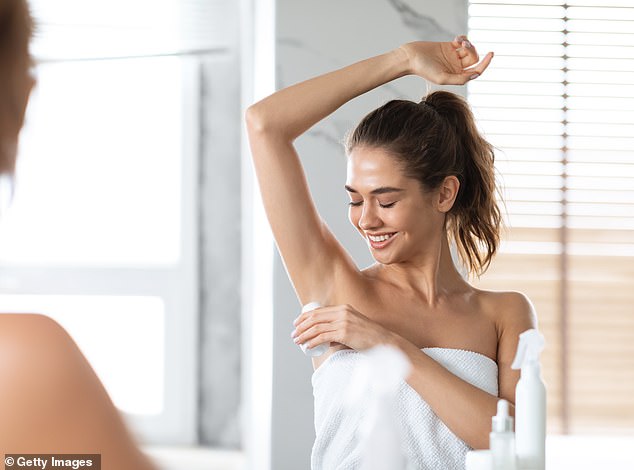We’re dermatologists – here’s the truth about full-body deodorants and whether it’s REALLY safe to use them on your boobs and groin
Deodorant is a common staple in many people’s hygiene products, but after all these years, the product is now venturing beyond the armpits to conquer a whole new frontier: your entire body.
In recent months the beauty market has been flooded with a slew of new ‘full-body’ deodorants, with every major hygiene brand pitching in with their own offerings, from Dove and Ban to Secret and Native.
While each company has tried to put their own spin on the product – with some offering sticks while others have opted for creams – the overall concept remains largely the same.
Each formula aims to provide sweat and odor protection to all areas of the body, even the most intimate, from the breasts to the groin, with Ban even going so far as to release specific products targeting both the underboob region and the ‘intimate parts’. ‘.
Because there is so much more territory to cover, the price of these products can often be higher than that of a regular underarm deodorant. A regular stick from Secret will cost you just under $8, while their full body deodorant costs $11.97.
The product is intended to go to the external parts of your body that also produce sweat, such as the feet, groin and under the breasts
Likewise, an Old Spice underarm deodorant stick costs about $7.50, while their full-body product costs $12.99.
While Ban’s underarm antiperspirant costs about $5.49, the deodorizing lotion for private parts costs $9.99.
While these brands promote the product in fun scents like tangerine and coconut vanilla, along with slogans claiming it “applies like a dream,” is it really all necessary?
According to dermatologists, it is probably harmless, but not always necessary.
It is important to note that it also has a different function than a regular armpit deodorant.
“Full-body deodorants reduce body odor, but not sweat,” says a Mississippi dermatologist Dr. Lindsey Zubritsky told DailyMail.com.
She said there is a difference between antiperspirants – the category that many body deodorants fall into – and deodorants.
“Antiperspirants contain active ingredients such as aluminum salts that reduce sweating, while deodorants contain ingredients that reduce odor without stopping sweating,” says Dr. Zubritsky, also known as @dermguru online, explained.
“Typically, deodorants (especially full-body deodorants) contain active ingredients that reduce odor-causing bacteria on the skin and thus neutralize body odor, such as alpha hydroxy acids, alcohol or piroctonolamine,” she added.


FEMAIL spoke to expert, board-certified dermatologists Dr. Lindsey Zubritsky (left) and Dr. Margarita Lolis (right) for their opinion on whether or not it is a necessary product
‘These ingredients work by acting directly on the microbe or lowering or raising the pH of the skin, making it inhospitable for bacteria to live and thrive.’
The dermatologist said that if body odor makes you extremely self-conscious, it’s okay to try full-body deodorant.
Most brands also make it in cream or spray form.
“They can make a difference in the right person, but that’s not absolutely necessary,” explained Dr. Zubritsky to DailyMail.com.
However, if you’re looking for a full-body deodorant, you should look for one that contains clean ingredients.
“In general, these deodorants are free of aluminum, parabens, phthalates and synthetic fragrances,” according to a New Jersey dermatologist Dr. Margarita Lolis of skin laser and surgery specialists told DailyMail.com.
“Many people prefer to avoid these ingredients due to health concerns and skin sensitivities,” she explained.
But before you apply the new product all over your body, Dr. Zubritsky recommends first doing something called a patch test.

If you’re looking for a full-body deodorant, look for one that contains clean ingredients (stock image)
In a patch test, a small amount is applied to the skin, for example on the inside of the arm, and it is observed how the body reacts.
The dermatologist also suggested trying one that is fragrance-free, and not applying it to the entire body, just to the areas examined, such as the groin and feet.
“There are several on the market that are fragrance-free and contain moisturizing ingredients that should not cause irritation,” she told DailyMail.com.
‘I would avoid it if you have open areas on the skin or if you have certain skin conditions such as hidradenitis suppurativa.’
This also applies to people with conditions such as allergic contact dermatitis or eczema.
And if your body odor still persists or causes significant problems for you even after trying a full-body deodorant, Dr. Zubritsky to see a board-certified dermatologist for a check-up.
